
Hair Balm: Cocoa Butter Whip
- Out Of Stock

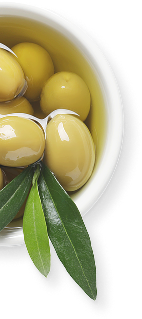
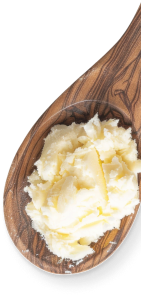

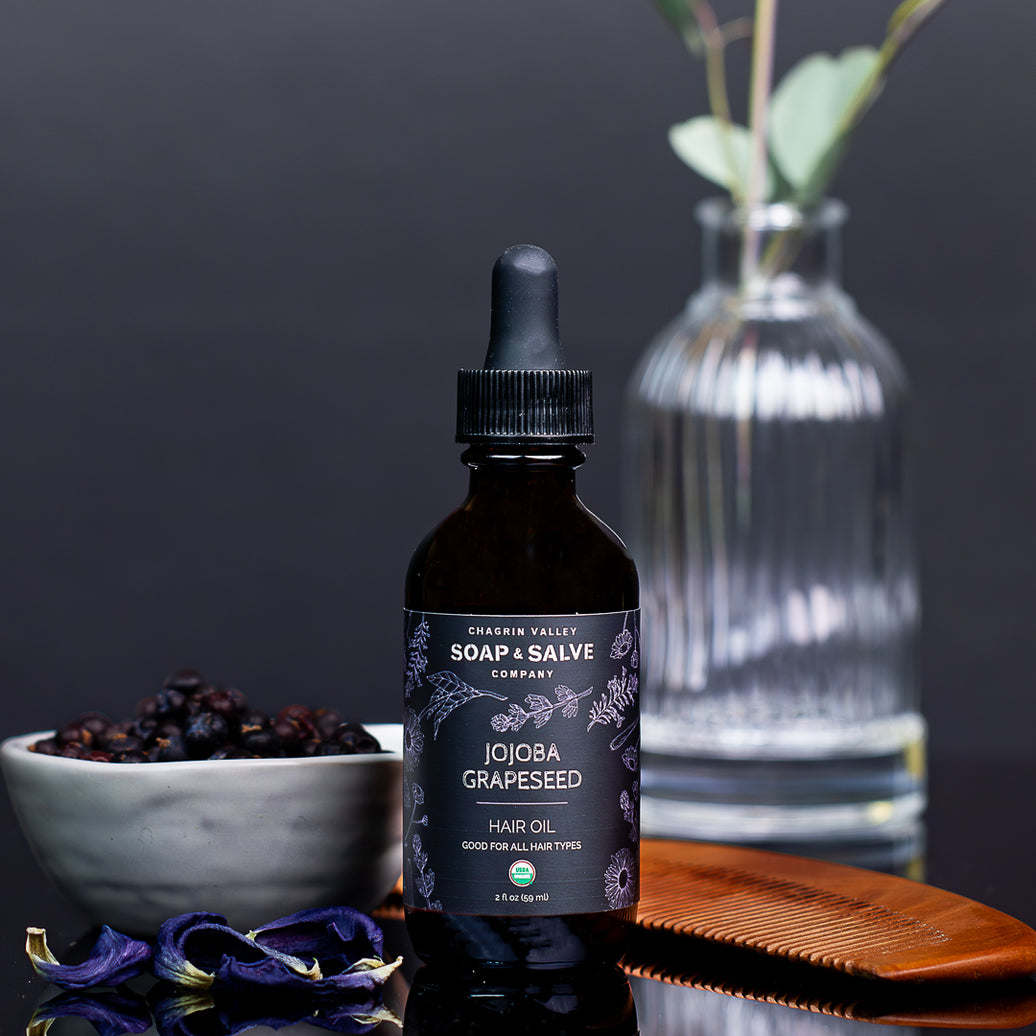
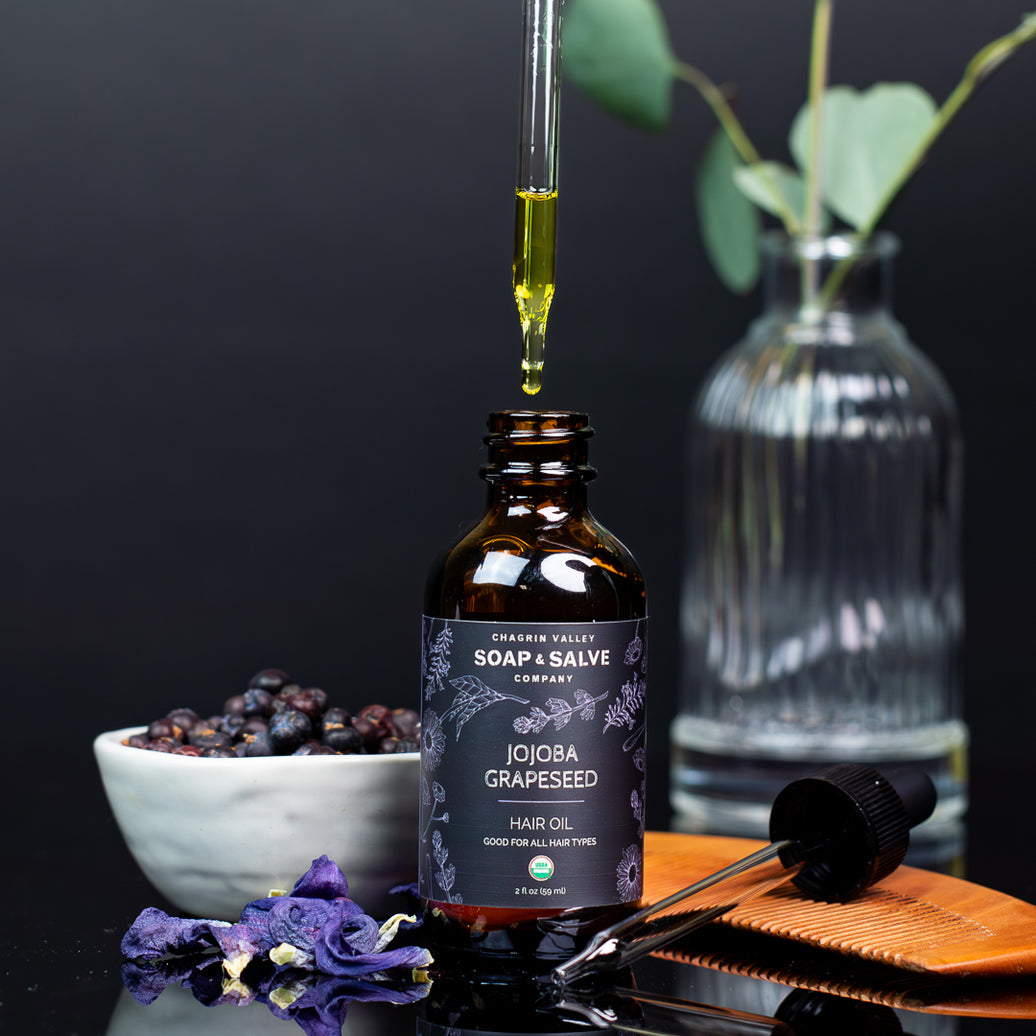
An organic hair oil that contains jojoba oil which helps balance oil production, strengthens the hair follicle and shaft, and promotes a healthy shine.






Good For: All Hair Types
Hair-oiling may be new to many people, but its benefits have been proven from centuries of ancient tradition. A hair oil can be helpful for any hair type, especially if it has become dry or damaged due to heat or over-processing. Naturally textured hair, which can be drier than other hair types, is prone to breakage if it is not moisturized regularly. Our organic hair oils contain hydrating ingredients that provide a protective layer of moisture for those who need damage repair or those with curly or coily textured hair who choose to wear their hair naturally.
This light organic hair oil contains jojoba oil with a molecular structure similar to that of sebum (our natural hair oil).
Grapeseed oil promotes healthy hair and has been used in conjunction with jojoba oil as an anti-hair loss massage. It also provides good slippage for detangling hair.
These oils are very light and penetrate easily. Great for all hair types.
Comes in a 2 oz. glass bottle
The internet is filled with so much information about hair oiling, it can be quite overwhelming. Oil your hair but not your scalp! Oil your scalp but not your strands! Oil both! While your hair type, hair thickness, the climate in which you live, your diet and lifestyle, health, etc. all affect your hair, the bottom line is, your hair is unique to you. There is no one right way to use a hair oil on YOUR hair. What we offer below are some suggestion.
It is important to start small when applying a hair oil and to know what you are trying to achieve in the end. Begin with one or two drops (you may need a bit more for longer or thicker hair). If your hair looks greasy, heavy or seems weighed down, you have used too much. After a few applications of hair oil, you will learn your magic number for that perfect healthy, shiny, soft hair.
The most important thing about using a hair oil is to make sure it is distributed evenly. Sectioning your hair into layers, a top and bottom layer, can make distribution easier especially for those with thick or coarse hair.
Whether you apply a hair oil to wet or dry hair depends on your hair type and the results you are looking for. Applying oil on damp hair will provide a bit less shine, but it can help detangle hair, bring out its natural texture as it dries, provide nourishment for the hair shaft, and protect it from unwanted frizz as it dries. If you blow dry your hair, this method can also provide some protection from the heat.
When applied to dry hair, the hair will have more luster, you will get better frizz control, and you can spot treat extra problem areas.
Use it as a pre-shampoo, deep conditioning treatment once or twice a week depending on your hair type. Your hair will become softer and easier to manage.
Tip: Any time you are leaving oil on your hair, cover your hair with a shower cap or towel. This keeps your head warm which helps the oils penetrate the hair shaft.
Apply the oil using the basic method above and let it sit for 10 minutes while you complete the rest of your shower. Wash, rinse, and style as usual.
On Damp Hair: Use as a leave in conditioner after shampooing to help prevent split ends, calm frizz and flyaways and add a healthy shine. Place a drop or two in the palm of your hand, rub palms together and scrunch into damp hair ends or smooth from mid-length to the hair ends. Comb thoroughly to evenly distribute the oil. Do not wash. Style as usual.
On Clean Dry Hair: To smooth down coarse or wiry flyaway hair strands and give hair a healthy sheen, rub a tiny bit of hair oil in your palms, apply to clean, dry hair.
Tip: Some like to spritz oil onto the lower length of their hair and hair ends and then massage it into the strands. This method works well if you have a bottle with a fine mist sprayer. Oils tend not to mist like water, so try your sprayer out first before squirting your hair.
If you have fine or thin hair that seems dull and lifeless or tends to have wiry flyaways, a tiny bit of lightweight leave in-conditioner may just do the trick.
After shampooing for a healthy shine and to calm flyaways, place a drop of oil in the palm of your hand, rub palms together. Then rake your hands and fingers through your hair like a comb to evenly distribute the oil through to the ends.
You can do this on damp, towel-dried, or even dried hair, it just depends what works best for your hair. Be sure to work the oil through to the tips to help ease split ends. Comb your hair thoroughly to get the oil evenly distributed.
You can also just use a tiny bit of oil in your palms to scrunch into the ends of damp or dried hair to help ease the look of split ends. Just remember, only a tiny bit of oil is needed.
For some people it is recommended to avoid applying oils or butters to the scalp. So when using a hair oil begin at least about three inches from the scalp and work all the way to the ends.
Whether or not to oil your scalp seems to be up for debate. While many articles encourage applying oil directly to your scalp, others state that applying oil directly on your scalp may put you at higher risk for dandruff. But some people with dry hair also have a dry scalp. If you typically oil your scalp without any problems then continue to do what your hair and scalp like.
For Dry Scalp: Using your fingertips gently massage a small amount of hair oil into your scalp. The actual massaging action is more important than the quantity of oil, it stimulate scalp circulation and aids in absorption. Then work the oil through your hair to the ends. Leave on for at least 15 minutes and then wash and style as usual.
Learn more: Read "What is Your Hair Type?"
If you have very sensitive skin or are simply trying a new product for the first time, we always recommend doing a patch test.
For external use only. Discontinue use if irritation occurs. Best if used within 6 months of opening.

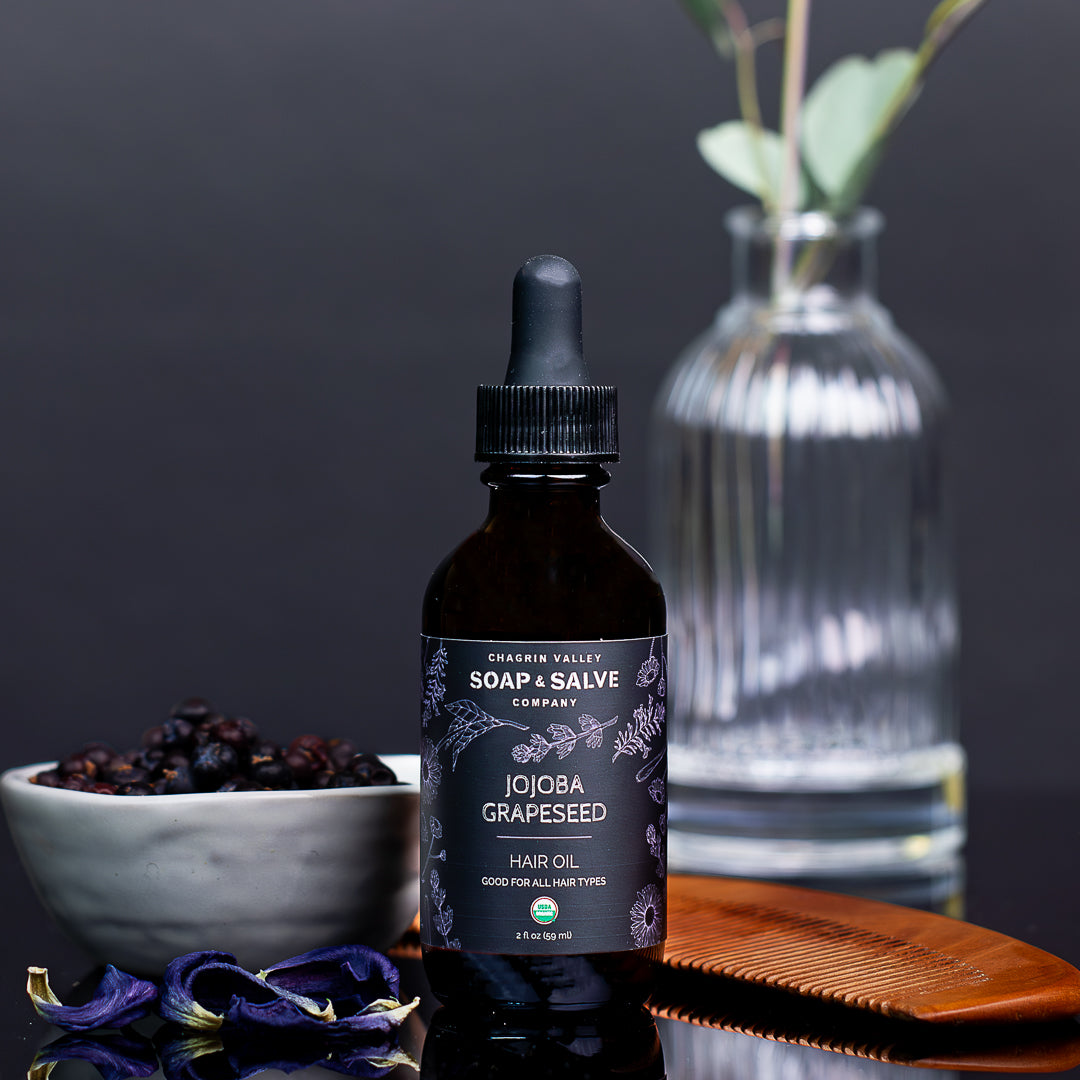
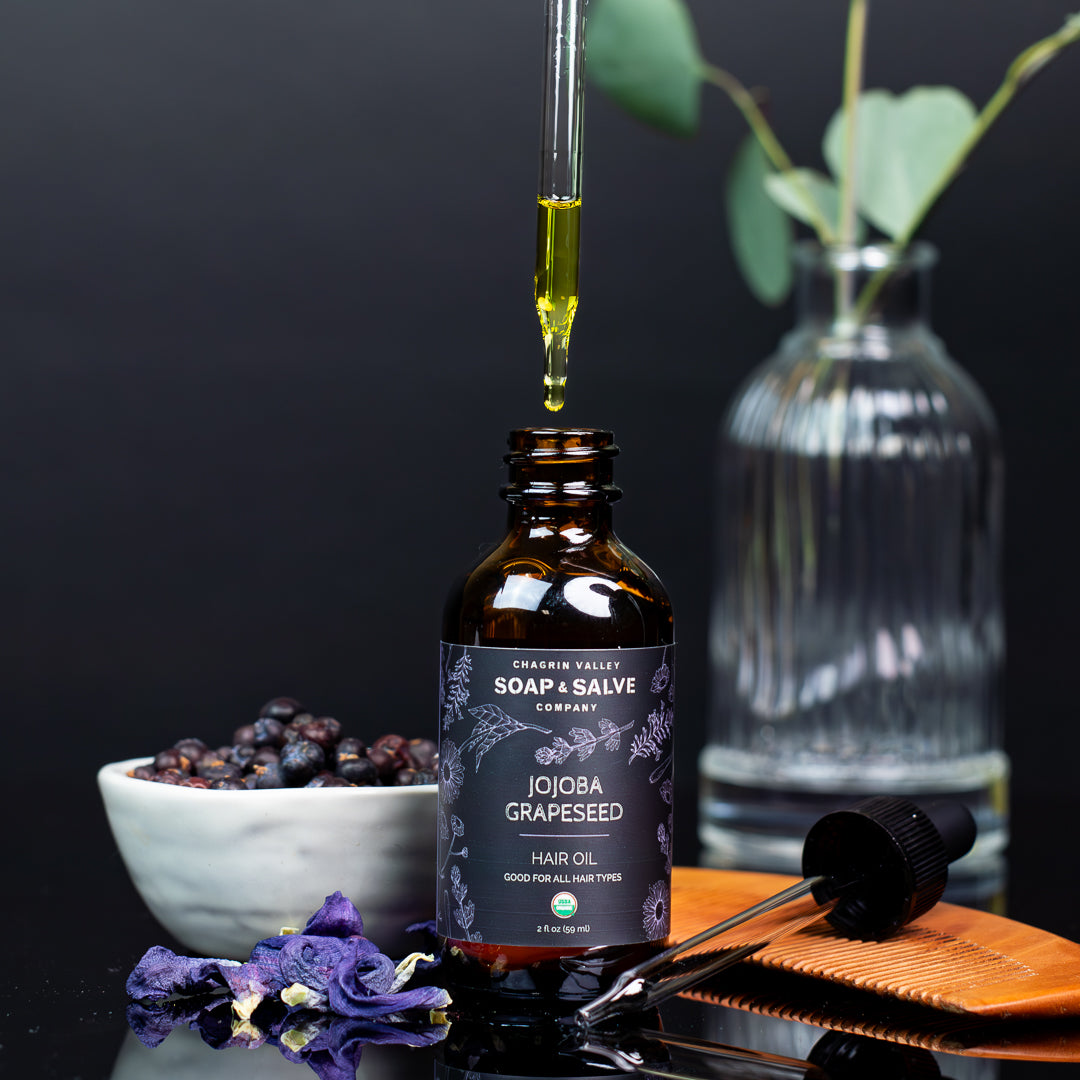
The goal is simple: to Harness the Power & Simplicity of Nature® to cleanse, soothe, heal, and protect your skin and hair!
Our unique formulas rely on moisturizing oils and butters, healing botanicals, and pure essential oils. We choose every ingredient with one end-result in mind….the BEST possible natural skin care for YOU!
 Organic Jojoba Oil
Organic Jojoba Oil
 Organic Grapeseed Oil
Organic Grapeseed Oil
We use unrefined oils that have not been bleached or deodorized. These oils retain their natural scent, color, and nutritional benefits.

The most important consideration in any business is its customers. Today's world of misleading claims, false advertising, and simple deception, often leaves consumers trying to discover the truth about personal products and their ingredients.
Some of my favorite products are made with ingredients that just do not exist as certified organic. Why? At this time there are no standards created for ingredients specifically used in the personal care product industry. Organic certification of personal care products is based on the organic food standards set by the National Organic Program of the USDA.
But since we are a certified organic company, we are required to submit documentation that even our "non-organic ingredients" were produced without the use of toxic pesticides, genetically modified organisms (GMOs), sewage sludge, or irradiation.

Why Did We Become a Certified Organic Company?
What Do All of the Organic Labels Mean?
Chagrin Valley Soap & Salve has been Leaping Bunny Certified since 2013.
 The Leaping Bunny Program was developed in 1996, by The Coalition for Consumer Information on Cosmetics (CCIC), to identify and support companies that are doing their part to help eliminate the unnecessary use and mistreatment of animals to test cosmetic products and ingredients. The CCIC is made up of eight animal protection groups including the Humane Society of the U.S., as well as groups from Canada and Europe.
The Leaping Bunny Program was developed in 1996, by The Coalition for Consumer Information on Cosmetics (CCIC), to identify and support companies that are doing their part to help eliminate the unnecessary use and mistreatment of animals to test cosmetic products and ingredients. The CCIC is made up of eight animal protection groups including the Humane Society of the U.S., as well as groups from Canada and Europe.
At Chagrin Valley we do not test our finished products on animals (other than human volunteers). But what about the raw materials, the ingredients we use?
Many products display labels claiming that their finished product is ‘not tested on animals’ but this does not guarantee that the product ingredients are actually free from animal testing.
The CCIC Standard is a pledge that a company makes to remove animal testing from all stages of product development. Our pledge to buy ingredients that are cruelty-free is integrated into the purchase agreement for all of our suppliers.
Personal care products displaying the “real” Leaping Bunny logo are certified ‘cruelty-free' using the internationally recognized Humane Cosmetics Standards. These rigorous standards require that no animal testing is performed or authorized for finished products or any of the ingredients in any stage of product development by the company, its laboratories or its suppliers after a fixed cut-off date. All Leaping Bunny companies are subject to independent audits and pledge commitments that are renewed on an annual basis.
This annual renewal is a key requirement that sets the Leaping Bunny Program apart from other cruelty-free certification programs. Companies that manufacture products, as well as their ingredient suppliers, must annually recommit to upholding their promise to not conduct animal testing on any finished products, ingredients, or formulations.
Why is this annual commitment renewal important? "Because product formulations change, suppliers come and go, and manufacturers develop innovative lines to meet consumer needs. But we know that compassionate consumers need to be confident that no animal testing is involved in the products they use."
At Chagrin Valley Soap & Salve . . .
The Leaping Bunny Program provides
the best assurance to consumers
that they are making compassionate shopping choices
by purchasing Cruelty-Free skin care!
 We often receive questions as to whether our soaps, shampoos, and other natural products are safe to use during pregnancy.
We often receive questions as to whether our soaps, shampoos, and other natural products are safe to use during pregnancy.
We recommend that expectant and nursing mothers check with their midwife or physician before changing a skincare routine with our organic products, or any other line of products.
Read the label on a bar of commercial soap. Read the label on your jar of moisturizer.
Now read the ingredients in a Chagrin Valley product.
We use quality natural and USDA Certified Organic ingredients. No synthetic additives, colorants, fragrances, preservatives, or chemical derivatives are used.
There is nothing in our all-natural basic soap or other products that could cause a problem in pregnancy.
Topically applying the herbs present in many of our soaps is also not a problem. Your skin will absorb much less herb from the soap than if you would sprinkle them on your food.
The issue that seems to be of most concern is the use of essential oils during pregnancy.
There is a lot of confusing, ambiguous, and inaccurate information concerning the use of essential oils in pregnancy.
The question of safety and safety testing has a lot to do with several factors.
But also, aromatherapy and massage therapy use much higher concentrations of essential oils than you find in soap or even in eating the herb. With aromatherapy, you are inhaling the high concentrations which get absorbed via the lungs and in massage therapy, the essential oils remain on your skin and are absorbed.
Our scented soaps are gently scented with essential oils, but the choice is between you and your health care professional. The most critical time is the first trimester.
Just about every one of our products, like lip balms, whipped butters, soaps, shampoos, and deodorants has a "no added scent" version.
When there is a growing baby to consider, if you are at all uncertain as to the safety of an essential-oil containing product, or any ingredient, please consult your doctor, midwife, or health care professional!
When it comes to safety during pregnancy it is understandable that many massage therapists and aromatherapists decide to err on the side of caution in recommending the avoidance of certain essential oils.
Some Herbalists and Aromatherapist believe that essential oils that are normally safe to use, are safe during pregnancy, while others will recommend avoiding all essential oils during pregnancy.
Some essential oils that are normally quite safe have hormone-like effects and some even stimulate uterine muscles, both of which would be contraindicated during pregnancy.
Please do not ask us if one of our products is safe to use during pregnancy--we will simply refer you to this page.
We do not provide a list of essential oils considered safe during pregnancy because the information available is very contradictory. One aromatherapy source will list an essential oil as problematic while another one states it is fine.
The information is also changing constantly. Please do your own research and consult your doctor, midwife, or health care professional for the most up-to-date information.
Even if you have never had sensitive skin in the past, you may notice that a product you have been using for several years now irritates your skin.
The stretching belly is often the most sensitive spot. Other potential problem areas include the hips, thighs, and bottom where the skin may become dry and flaky.
Although the exact cause is not known, raging hormones do make you more sensitive to a wide range of things, and also your skin is thinning and stretching as you, and your baby, grow.
These changes can behave in unpredictable ways. For example, if you have eczema you may suffer from major flare-ups or complete remission during pregnancy.
Keep your body well moisturized and avoid products that contain synthetic additives, colorants, fragrances, or preservatives. Any of these can exacerbate sensitive skin problems.
Before trying a new product, you can always do a patch test to test for sensitivity.
And again, we recommend that expectant and nursing mothers check with their midwife or physician before changing a skincare routine with our products, or any other line of products.
Pregnancy & Children: We do not provide information on the safety of essential oils during Pregnancy or for use in Children because the available information is very ambiguous and often contradictory. If you’re interested in using essential oils during pregnancy or with young children please do your own research and consult your doctor, midwife, or health care professional before use.
Trying to choose the right natural soaps or skincare products can be a bit overwhelming especially when you have allergies and/or skin sensitivities.
Since we proudly list every ingredient in all of our products, reading the ingredient list will help to eliminate ingredients that may cause you problems.
We always recommend doing a patch test before using any new products especially if you have sensitive skin or allergies.
We receive so many emails asking for help with allergies, we created categories in our “Help Me Choose” section to provide information for those with allergies or sensitivities to nuts, coconut, shea butter and gluten.
Check out our help me choose pages!!
If you are allergic or sensitive to any of the ingredients in our products, they may cause skin irritation. Even natural ingredients may cause sensitivities.
People with severe allergies--please note: If you have severe anaphylactic-type reactions to ANY of the ingredients in ANY of our products, please do not buy our products. We have dedicated soap rooms and product rooms that are kept meticulously clean, but we cannot guarantee against possible cross-contamination of individual ingredients.
The wholesome goodness of our handcrafted soap is available for your hair.
Shampoo bars are an all natural conditioning shampoo in a solid bar form. Yes, this is real shampoo in a solid bar. Shampoo bars are not a new idea.
They were commonly used before liquid detergent shampoos and conditions were invented in the 1940s.
Although the process for making a shampoo bar is the same as making soap, our shampoo bar "recipes" are specially formulated with natural plant oils, butters, botanicals and essential oils that nourish your hair and scalp.
Our shampoo bars contain no artificial fragrance, color, preservatives, detergents, alcohol, urea, formaldehyde, sodium lauryl sulfate, DEA, propylene glycol - or any of the other synthetic hair care additives.
Each of our shampoo bar selections contains a different blend of natural plant oils, essential oils, and herb infused oils. No two recipes are the same.
Click here for help choosing an all natural shampoo bar!
Please read "Everything About Shampoo Bars!"






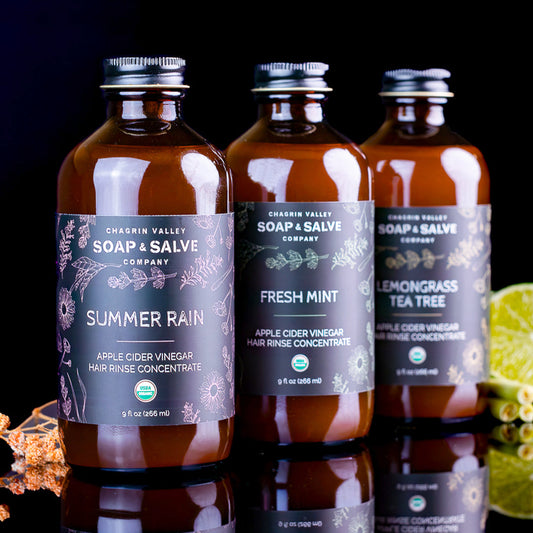
Apple Cider Vinegar is a great addition to any hair care regimen. Learn some tips, FAQs, and Recipes for using Chagrin Valley's Apple Cider Vinegar Rinses.
Read Post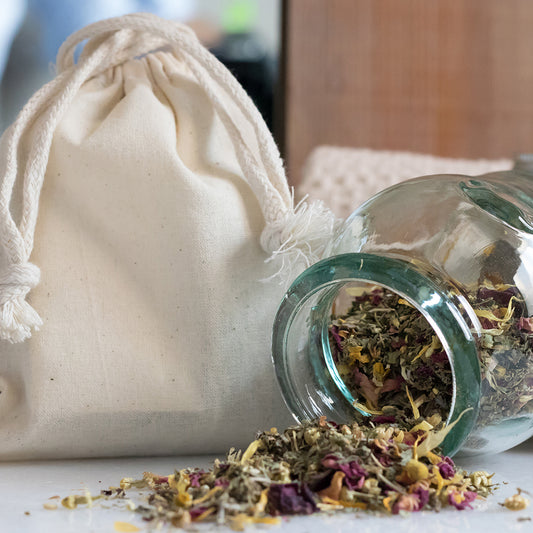
Herbal infusions have been used for centuries to naturally soften hair, enrich natural hair color, soothe irritation, prevent dandruff, stimulate the scalp, and restore luster, body, and bounce.
Read Post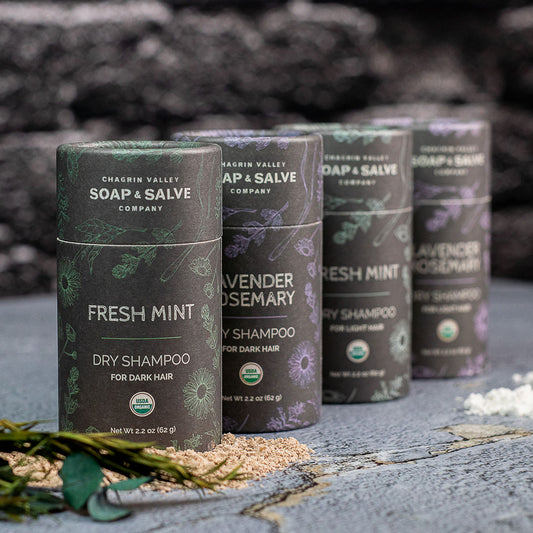
What is a Dry Shampoo? How Does Dry Shampoo Work? How Do You Use a Dry Shampoo? Are All Dry Shampoos the Same? In this blog, I hope to answer all of your dry shampoo questions!
Read Post